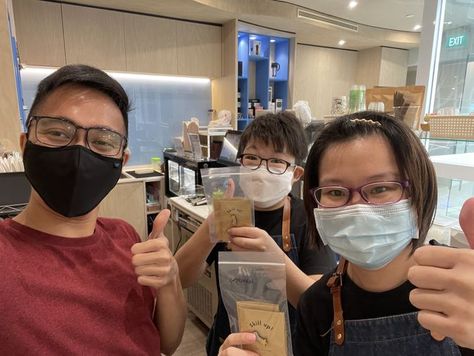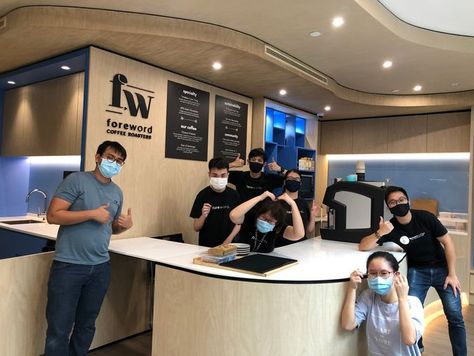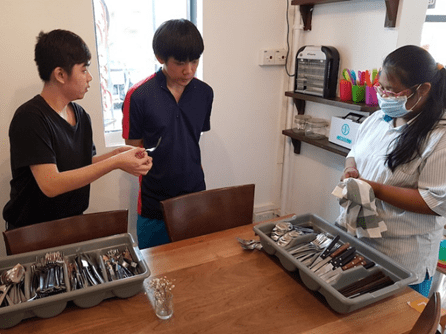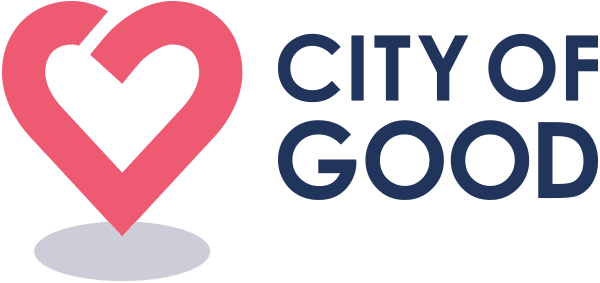Some food for thought. As individuals, how accommodative are we when it comes to people with different skills, abilities and personalities?
The Comprehensive Labour Force Survey revealed that over 28.2% of persons with disabilities of the ages 15 to 64 were employed in 2018 and 2019*.
With employment shortages surfacing in recent years due to the disruptions and changes brought on by Covid-19, there are growing opportunities to complement the workforce with skilled and trained labour from the persons with disabilities (PWD) and special needs community.
In this article, we spotlight two organisations that have embraced these individuals into their workforce: Foreword Coffee Roasters and Iron Nori.
*Source: Ministry of Social & Family Development
Why Employ PWDs and Special Needs Individuals?

(Photo credit: Foreword Coffee Roasters)
Lim Wei Jie, co-founder of Foreword Coffee Roasters, had a vision of using coffee to bridge PWDs with mainstream Singapore society.
At the age of 18 or 21 years old, PWDs graduate from their special education schools and begin to seek employment. While some with mild disabilities manage to integrate successfully into society, many others fall through the cracks as they require more support and understanding from their employers and co-workers.
At Foreword Coffee Roasters, the aim is to provide a safe and nurturing work environment for those with potential to work.
“Coffee was the chosen trade as it offered interaction opportunities for special needs individuals and the public. Through purchasing a cup of coffee, we hope our society learns to be more kind and patient towards PWDs in other settings”, he explains.
Bernard Chan, an operations consultant with the F&B joint Iron Nori, had wanted to hire Singaporeans and PRs but faced difficulties with suitable candidates.
He recalls one of their kitchen staff suggesting they look at employing graduating special needs students. With time, Iron Nori was able to identify the traits special needs staff had which could complement the other staff.
Bernard adds, “As an example, we found that most special needs staff are hardworking. They followed instructions and could withstand the tough working environment in the F&B industry”.
How To Build an Inclusive Culture in the Workplace

(Photo credit: Foreword Coffee Roasters)
The Foreword Coffee Roasters team sticks by a strengths-based perspective from the management level down to the café team operators. People are hired and placed into roles based on what they can do, regardless of their disability label.
Wei Jie adds, “Everyone is encouraged to communicate openly, and we can change the environment to make work easier for our staff. For instance, some parts of our coffee making process are automated. We have an automatic tamper and, in some outlets, we use automatic milk frothers”.
Staff joining Iron Nori are assessed on their comfort working with special needs colleagues. “This question will be the first determinant of whether the staff will be employed. If it is no, we will look immediately at the next candidate”, Bernard explains.
Workplace Policies and Support Systems to Empower Staff

some coffee! (Photo credit: Foreword Coffee Roasters)
At Foreword Coffee Roasters, all employees joining the company must be open to working with PWDs. Each full-time staff supports at least one other special needs co-worker in various work functions such as beverage preparation, customer service, or social media marketing. Flexible work arrangements for part-time employees are also accommodated.
There is also a quarterly “skills check-in” so management gets an understanding of how employees perform their tasks and if additional training is required. Focusing on individual progression, Wei Jie adds, “We do not benchmark and compare employees against each other but set goals with them to improve themselves from where they were before”.
A promotion system is in place for special needs staff in Iron Nori. Beginning as a steward, staff can progressively move to becoming a runner, waiter, cashier, and shift supervisor.
Bernard adds, “In the last 4 years, we have successfully promoted 3 special needs staff to the highest level of shift supervisor. This sets a motivation for staff to do better and earn a higher salary. The staff’s families are also thankful for these progression opportunities”.
Challenges and Gaps To Address
PWDs need more patience and understanding. They may face challenges in things ordinary people find easy, but they shouldn’t be quickly cast aside for being unable to complete their tasks efficiently.
Wei Jie advocates direct engagement. Supervisors are trained to be more observant in identifying challenges faced by PWDs and then speak with them to create solutions together. It’s desirable for employees to be independent at work and employers need to provide accommodations for them to perform in the workplace.
“However, we also need to acknowledge that we are a business, and if a PWD is unable to perform their assigned tasks after much accommodation and support, then the job fit may not be there”, he explains.

School students. (Photo credit: Iron Nori)
Over at Iron Nori, a special needs staff is subjected to a slower work process and mistakes on the job may occur. This may not fit well with the expectations of some diners who are used to high quality and fast services.
The restaurant rarely encounters empathetic diners who are passionate about the cause, and who are able to accept these mistakes. Bernard reasons, “It’s not an easy problem to solve. It will take time to develop an empathetic Singapore, inclusive and tolerant of differences, especially between the neuro-typical and neuro-atypical”.
How Employing PWDs and Special Needs Individuals Has Led to Positive Change
The work at Foreword Coffee has provided the team with meaning. PWD employees have gained confidence and many of them have shown personal growth over the years. The team thrives on knowing that their customers enjoy their time at the cafes when they read online reviews and social media posts.
However, these achievements have not been a walk in the park.
“Some people in our team have gone through moments of burn-out and felt helpless in certain situations. However, we have learnt to manage ourselves emotionally and every little milestone provides us with the motivation to keep us going”, he adds.
For the team at Iron Nori, it has created a diversified and inclusive work culture. The staff understands that everyone has their own unique differences. “The work culture is that of patience and tolerance, more than the usual heated F&B environment”, Bernard explains.
Iron Nori has managed to cultivate recurring customers who know the restaurant is manned by special needs staff. Bernard adds, “We do not openly brand our special needs staff as it’s not our focus to attract diners sympathetic to the cause. Diners who appreciate the good food, coupled with the purposeful cause would become repeat customers and provide great referrals”.
If you’d like to show your support to the PWD and Special Needs community, you can donate or volunteer with non-profit organisations dedicated to the cause!




















